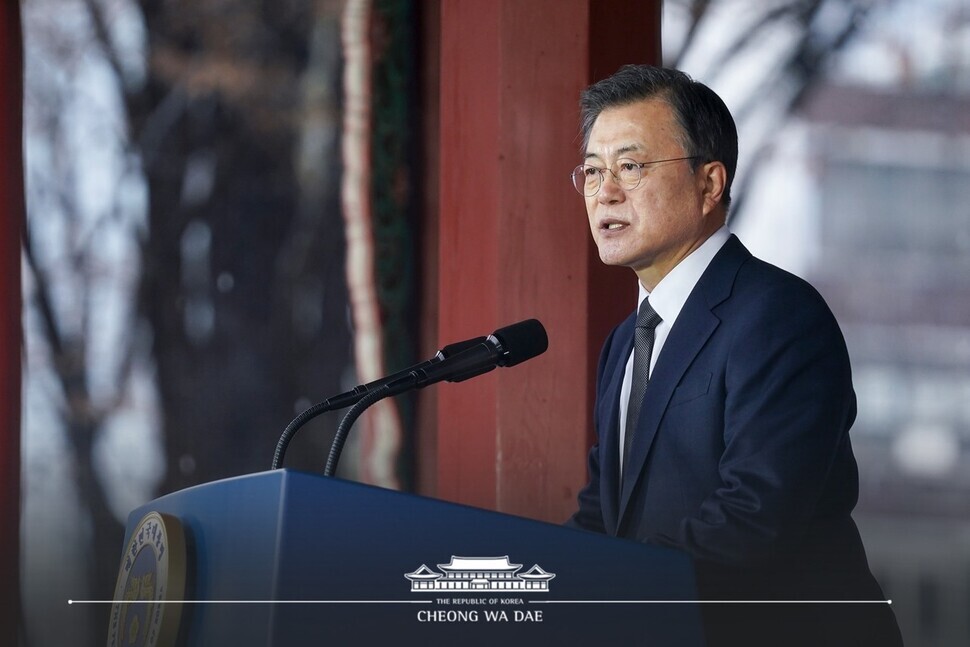hankyoreh
Links to other country sites 다른 나라 사이트 링크
[Editorial] Japan should reciprocate S. Korea’s gesture for conversation

During a speech commemorating the March 1 Independence Movement at Tapgol Park in Seoul on March 1, South Korean President Moon Jae-in said that South Korea-Japan relations “must not be hobbled by the past.”
“We must put even more energy toward future-oriented development, while resolving historical issues in their own way,” Moon said.
By reaffirming the “two-track” approach of keeping historical disputes separate from current issues, Moon voiced his determination to improve South Korea-Japan relations more firmly than ever before.
Moon made no direct mention of issues regarded as sensitive by the Japanese government, including the Japanese military’s “comfort women” system and Koreans drafted for forced labor during World War II.
Past presidents have used their March 1 address to send important messages about South Korea-Japan relations and inter-Korean relations. This year’s message was received with particularly keen interest because it followed the inauguration in January of US President Joe Biden, who has emphasized restoring trilateral cooperation with South Korea and Japan.
Responding to Moon’s address, the Japanese government said, “The important thing is for the South Koreans to take responsible and specific steps to resolve pressing bilateral issues.”
That’s disappointing. A relationship that some say has reached its lowest point since the establishment of diplomatic relations in 1965 can’t be repaired by unilateral concessions from one side.
The South Korean government should certainly explore wise solutions, but it mustn’t abandon its basic principle of taking a victim-centered approach to historical issues. We hope the Japanese government will set aside its rigid demand that South Korea must take the first step toward improving relations.
Since a South Korean court ruled this past January that the Japanese government has to directly compensate the comfort women survivors, Japanese Prime Minister Yoshihide Suga and Foreign Minister Toshimitsu Motegi have refused to meet with South Korea’s new ambassador Kang Chang-il or to speak on the phone with South Korean Foreign Minister Chung Eui-yong.
If Japan truly wants to resolve this problem, it needs to work it out with South Korea rather than demanding that South Korea do all the work. As the expression goes, it takes two to tango.
Moon proposed that Japan enter dialogue while trying to see things from South Korea’s point of view. “The only obstacle that we must overcome is our failure to keep issues of the past separate from issues of the future, which obstructs future development.”
Moon mentioned the Tokyo Olympics, scheduled for July, as an area of potential cooperation between the two countries. As Moon said, the Olympics could be an opportunity for dialogue of several kinds — between South Korea and Japan, South and North Korea, North Korea and Japan, and North Korea and the US.
But South Korea-Japan relations have to improve if the Tokyo Olympics are to provide an opportunity for restarting the Korean Peninsula peace process. We hope that the two countries will combine their resources for the sake of stability and mutual prosperity in Northeast Asia.
Please direct comments or questions to [english@hani.co.kr]

Editorial・opinion
![[Column] Season 2 of special prosecutor probe may be coming to Korea soon [Column] Season 2 of special prosecutor probe may be coming to Korea soon](https://flexible.img.hani.co.kr/flexible/normal/500/300/imgdb/original/2024/0426/3317141030699447.jpg) [Column] Season 2 of special prosecutor probe may be coming to Korea soon
[Column] Season 2 of special prosecutor probe may be coming to Korea soon![[Column] Park Geun-hye déjà vu in Yoon Suk-yeol [Column] Park Geun-hye déjà vu in Yoon Suk-yeol](https://flexible.img.hani.co.kr/flexible/normal/500/300/imgdb/original/2024/0424/651713945113788.jpg) [Column] Park Geun-hye déjà vu in Yoon Suk-yeol
[Column] Park Geun-hye déjà vu in Yoon Suk-yeol- [Editorial] New weight of N. Korea’s nuclear threats makes dialogue all the more urgent
- [Guest essay] The real reason Korea’s new right wants to dub Rhee a founding father
- [Column] ‘Choson’: Is it time we start referring to N. Korea in its own terms?
- [Editorial] Japan’s rewriting of history with Korea has gone too far
- [Column] The president’s questionable capacity for dialogue
- [Column] Are chaebol firms just pizza pies for families to divvy up as they please?
- [Column] Has Korea, too, crossed the Rubicon on China?
- [Correspondent’s column] In Japan’s alliance with US, echoes of its past alliances with UK
Most viewed articles
- 1After election rout, Yoon’s left with 3 choices for dealing with the opposition
- 2Why Kim Jong-un is scrapping the term ‘Day of the Sun’ and toning down fanfare for predecessors
- 3Two factors that’ll decide if Korea’s economy keeps on its upward trend
- 4Noting shared ‘values,’ Korea hints at passport-free travel with Japan
- 5AI is catching up with humans at a ‘shocking’ rate
- 646% of cases of violence against women in Korea perpetrated by intimate partner, study finds
- 7Why Korea shouldn’t welcome Japan’s newly beefed up defense cooperation with US
- 8‘We must say no’: Seoul defense chief on Korean, USFK involvement in hypothetical Taiwan crisis
- 9[Column] Season 2 of special prosecutor probe may be coming to Korea soon
- 10Fast Food Workers’ Day comes to South Korea